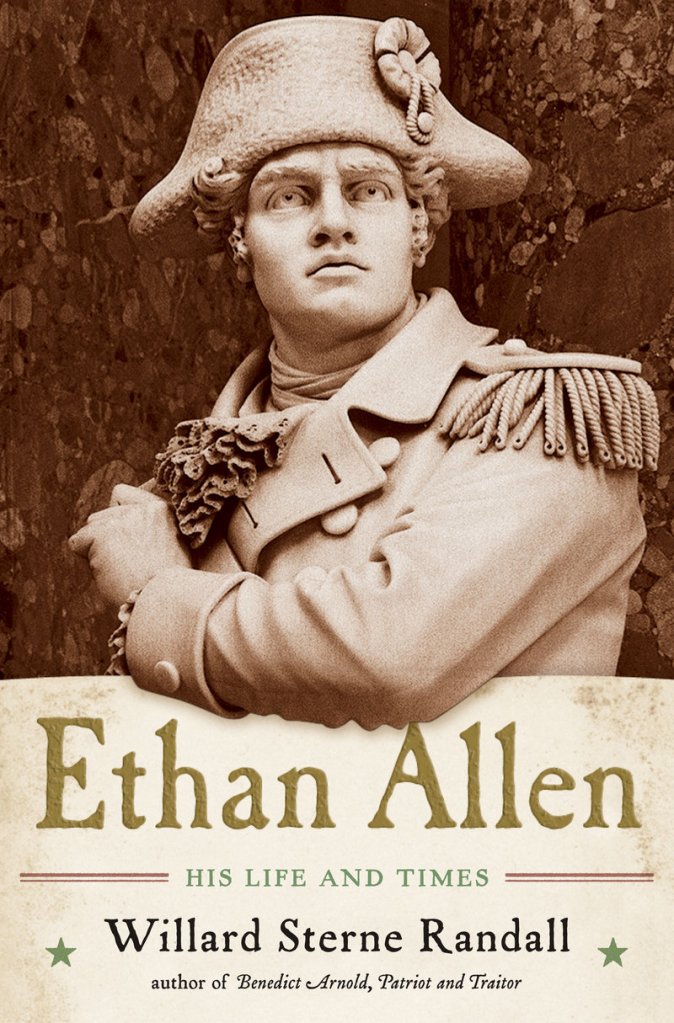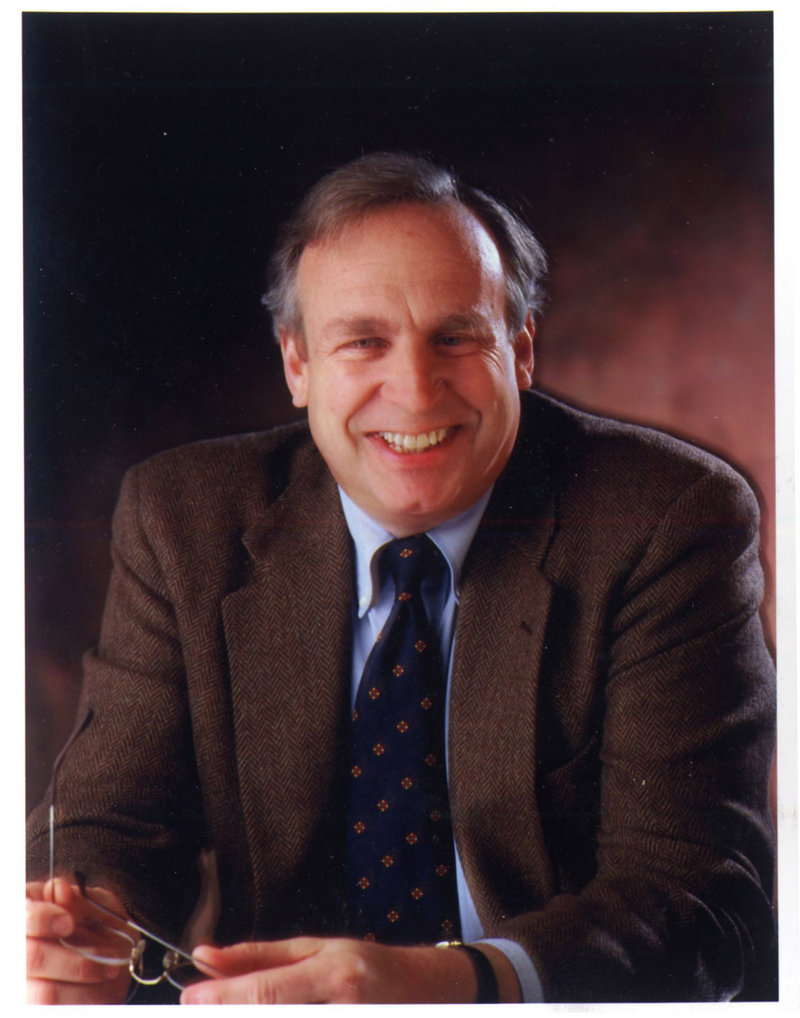Ethan Allen was a rebel even before the American Revolution. After being made unwelcome in Connecticut, where he was born and raised, and Massachusetts, he ended up in Vermont as a farmer, hunter and land speculator, buying and selling property based on grants given by New Hampshire.
But New York also claimed the New Hampshire Grants, and Allen became leader of the Green Mountain Boys, a group fighting to save the land for the people who had cleared it and were working on it. Once the Revolution started, he captured Fort Ticonderoga with Benedict Arnold, led an invasion of Montreal, and was captured and held prisoner for 31 months. He was instrumental in the establishment of Vermont.
“Ethan Allen: His Life and Times” (Norton, $35) by Willard Sterne Randall of Burlington, Vt., is the first biography of Allen in more than 50 years. But it is also more.
It explains the religious divisions and strife in New England that preceded and, in part, precipitated the Revolution. It describes land disputes among states, the settling of wilderness areas, the development of an early iron industry in New England and much more.
Randall has no Maine appearances scheduled in connection with the book, but his wife is from Bangor and went to Colby College, and he will be visiting Maine later this month. “If someone left a nickel on the ground, I’d probably come and talk,” he said.
Q: The part about evangelical Puritans and the split between Deists and Puritans was new to me. So, religious tolerance was not something that the people from the colonies brought to America when they escaped religious persecution in England and Europe?
A: Exactly right. Religious tolerance never seemed to enter their mind. In the old Puritan line, you were either with them or against them. This was a church state in New England. The clergy were the judge, and anybody who did not conform to their Puritan ways was in trouble with the law. This history of religious intolerance went from the first settlers until 1789. In the South you had to be Church of England, and in New England it was Puritan, which became Congregational.
The American Revolution was not just about throwing off the British or gaining independence; it was about everything, including religion. There were a lot of religions. The Masonic movement, which is like a religion, basically replaced faith with reason and the mind. It looked for a while as if the country was going to go Deist, but that sort of veered off and became Unitarian. It was Jefferson’s idea that you have to promise people in religious minorities that there will be separation of church and state.
Q: I had no idea that while the Revolution was going on, there were all these disputes between New York and Vermont or New Hampshire, and Connecticut or Pennsylvania that almost erupted into battle.
A: A whole range of land disputes almost resulted in defeat for the Revolution. It took five years after the fighting ended to enact the Articles of Confederation. Connecticut claimed part of Pennsylvania; Virginia claimed all the way to the Pacific Ocean, although nobody knew where the other side was. Maryland said they weren’t signing because they were boxed in. It took the efforts of Madison and Jefferson to settle this.
Q: I’m just getting to my first Ethan Allen question, which shows that the “Life and Times” part of the book is accurate. Taking Fort Ticonderoga was almost too easy. Were Allen and Benedict Arnold actually heroes, or is that overrated?
A: Ethan Allen, just by stepping ashore in New York, risked being hanged right on the spot without judge or jury because he had been deemed traitor by New York. And the British, it turns out, had as many people in the fort as Ethan Allen had with him, 80 men and 60 women, and Allen had a group of hunters and farmers who had never shot at a human. Of course, Allen had the advantage that the men in the fort didn’t know there was a war on. The message had to go up through Halifax, and Paul Revere and his allies had all their messengers. So, yes, he was a hero.
Q: Did his easy success at Ticonderoga make him cocky and result in a foolish attempt at Montreal?
A: Everybody else thought he was cocky. All the old, wise farmers of Vermont wanted him out of there; they voted him out as commander and put in Seth Warner. But Allen had the right idea; he was one of three people who had the right idea on how to win the war quickly. He and Washington and Arnold wanted to go fast and take Quebec, because there were only 600 British troops in all of Canada. But the generals listened to former British officers and laid siege to Fort St. John instead of going for broke and taking Montreal and then going up the river and taking all of Quebec. If they had done that, the war would have been over before winter.
Q: You write about Allen’s poor treatment as a prisoner of the English as having an effect on how prisoners were treated in the Civil War. Has the Patriot Act eroded some of that?
A: I think the way Ethan Allen was treated was partly his own fault. He didn’t want to escape, although he helped others escape. He wanted to be swapped for an officer of equal rank, and he eventually was swapped for an officer who was a member of Parliament. A big question, where we come to today, is what do you do if you are dealing with an insurrection or an uprising? Are the leaders criminals or officers?
The British would never call George Washington general, because he did not have a commission from the king. All letters to him were sent to Mr. Washington. Lincoln set up the Atlanta model in 1861, which was much different, involving hundreds of thousands of soldiers, with a lot of swaps of prisoners.
The same thing comes up with the Taliban and the kind of care we give them. Allen was kept prisoner so long on a ship because you can’t serve habeas corpus on a Navy ship, and if we are using Guantanamo, a Navy base in another country, is that treated like a ship?
Q: In Ethan Allen’s negotiations with England toward the end of the war, do you think he could have betrayed the Revolution like Arnold did, or was he a manipulator trying for every advantage for Vermont?
A: Ethan Allen was not acting alone. Eight leaders of Vermont knew about it. They saw a way through Machiavellian politics to twist the arm of the Continental Congress to let Vermont in the union, even though New York opposed it.
But Vermont and parts of New Hampshire were not being protected by the Continental Army, and the negotiations kept the British from attacking. Near the end of the war, Frederick Haldimand, governor general of Canada, said of Allen: “I think we have been had.”
Q: Ethan Allen was a Deist, definitely not a churchgoer, and an independent thinker. His Green Mountain Boys were likely similar. Is the Vermont of (Sen.) Bernie Sanders a direct descendant of Ethan Allen’s, or is it more complicated than that?
A: I think Americans have always thought of Vermont, like Maine, as a place they can go to have fun and start over. It was full of Baptists and Deists and a wide variety, and when Puritan missionaries came up from Yale, they were horrified by such diversity.
Vermont has always been considered the most liberal state by those who use that as a dirty word. It never had slavery, never had a debtors prison, (hasn’t) had an execution in more than 60 years.
It has the oldest printing press in North America, which they got from Harvard, through which they printed the books and pamphlets Ethan Allen wrote attacking New York for its claim of Vermont ownership.
Q: I was surprised that Thomas Paine cribbed a lot of his “The Age of Reason” from Allen’s “Reason, the Only Oracle of Man.”
A: They knew each other, and Paine knew Allen was working on the book. At that time, he had started signing his letters “The Clodhopper Philosopher.” Allen was an early rationalist, and if he had lived longer — he died at 51 — he would have become an existentialist like (Ralph Waldo) Emerson.
Tom Atwell can be contacted at 791-6362 or at:
tatwell@pressherald.com
Send questions/comments to the editors.




Success. Please wait for the page to reload. If the page does not reload within 5 seconds, please refresh the page.
Enter your email and password to access comments.
Hi, to comment on stories you must . This profile is in addition to your subscription and website login.
Already have a commenting profile? .
Invalid username/password.
Please check your email to confirm and complete your registration.
Only subscribers are eligible to post comments. Please subscribe or login first for digital access. Here’s why.
Use the form below to reset your password. When you've submitted your account email, we will send an email with a reset code.